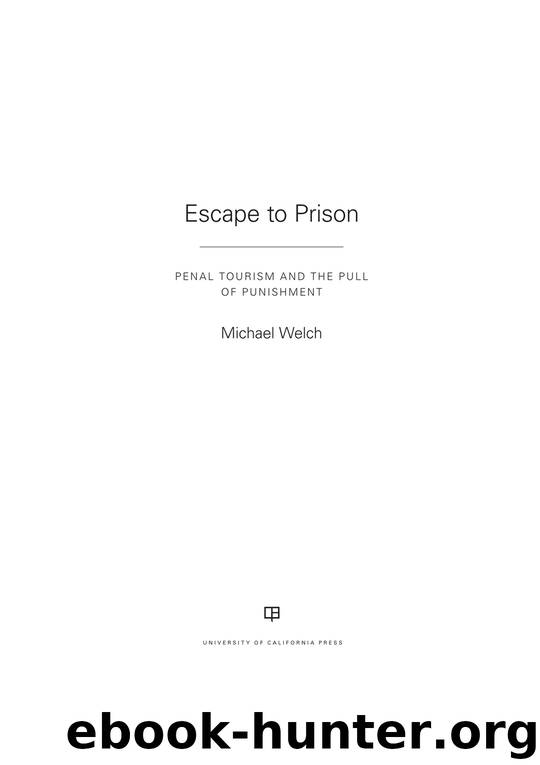Escape to Prison by Welch Michael

Author:Welch, Michael
Language: eng
Format: epub
ISBN: 9780520286153
Publisher: University of California Press
PUNISHING THE POOR
The coupling of prisons and economics is a major theme in penal tourism at the Clink museum in London. There, the tale of the impoverished is conveyed through the use of positioning and movement; those internal spatial tactics provide visitors with a “walk through” history (Williams, 2007: 99). The Clink’s museum effect is darkened as penal spectators step into a dimly lit, cramped space that previously functioned as a dungeon for debtors. A placard explains the Statute of Acton Burnell (1283 AD) that allowed “creditors to imprison their debtors till they were repaid.” Henceforth, the Clink (“the prison that gave its name to all others”) served as a debtors prison until the end of its days. A similar storyboard adds to that account, pointing out that until the nineteenth century, prisoners were expected to pay for their own imprisonment. Upon reflection, one can detect a certain neoliberal explanation as the text states that the prisoners “had, after all, brought it upon themselves.” That commentary on blame is repeated on another plaque that injects religion with a punitive tone: “Said Chief Justice Montague (1550 AD): The prisoner should live on his own goods. And if he had no goods he should live on the charity of others, and if others will give him nothing then let him die in the name of God . . . for his own presumption and ill-behaviour brought him to that punishment.” The harsh condemnation of debtors, however, is offset by other statements on the widely accepted practice of charity, hinting at the genuine ideals of the welfare state and the cult of the individual. A sign located near the entrance of the museum reminds visitors: “Many prisoners had to beg to survive, and in the cells of the Clink street-level gratings were thoughtfully provided for that purpose. Ordinary citizens did respond: in a cruel and chaotic age no-one could be sure they might not one day find themselves falsely imprisoned . . . Henry VII himself left 2,000 pounds for charity, including 300 pounds for ‘miserable prisoners condemned for debt or other cause’” (see figure 16).
Since the Clink was intended to be financially self-sufficient, it did not pay the jailers; rather, their income was extorted from the prisoners and their families. Basically, all features of their “accommodation” were subject to a fee: food, drink, and clothing. Additionally, prisoners paid an entering charge and a departure charge to cover the cost of having their fetters fitted and removed. One of the early scenes of the tour shows a blacksmith attaching irons to a newly admitted prisoner: the sound of the hammer hitting the anvil is believed to be the origin of the Clink prison. The financial scheme of the jailer’s lot bred corruption as prisoners quickly accrued a debt to the keeper, further extending the length of their confinement and misery.
Download
This site does not store any files on its server. We only index and link to content provided by other sites. Please contact the content providers to delete copyright contents if any and email us, we'll remove relevant links or contents immediately.
Cecilia; Or, Memoirs of an Heiress — Volume 1 by Fanny Burney(32558)
The Great Music City by Andrea Baker(32018)
Cecilia; Or, Memoirs of an Heiress — Volume 2 by Fanny Burney(31956)
Cecilia; Or, Memoirs of an Heiress — Volume 3 by Fanny Burney(31941)
We're Going to Need More Wine by Gabrielle Union(19045)
All the Missing Girls by Megan Miranda(16023)
Pimp by Iceberg Slim(14506)
For the Love of Europe by Rick Steves(14121)
Bombshells: Glamour Girls of a Lifetime by Sullivan Steve(14073)
Talking to Strangers by Malcolm Gladwell(13370)
Norse Mythology by Gaiman Neil(13363)
Fifty Shades Freed by E L James(13239)
Mindhunter: Inside the FBI's Elite Serial Crime Unit by John E. Douglas & Mark Olshaker(9339)
Crazy Rich Asians by Kevin Kwan(9290)
The Lost Art of Listening by Michael P. Nichols(7506)
Enlightenment Now: The Case for Reason, Science, Humanism, and Progress by Steven Pinker(7311)
The Four Agreements by Don Miguel Ruiz(6763)
Bad Blood by John Carreyrou(6621)
Weapons of Math Destruction by Cathy O'Neil(6279)
